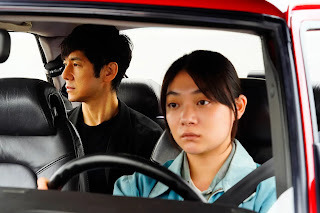Movies can be driven as much by what's not said as by the words characters speak. That's true of Drive My Car, a complex, challenging movie from Japanese director Ryusuke Hamaguchi.
Hamaguchi focuses on an actor (Hidetoshi Nishijima) who's asked to direct a production of Uncle Vanya in which the actors don't speak the same languages or don't speak at all.
One actress signs her role. The play is presented with supertitles but the actors -- many speaking different languages -- must somehow find their way to unity on stage.
Before all that, we meet Nishijima's Yusuke who’s living with his wife Oto (Reika Kirishima). Oto writes for television. The couple seems happy, two well-matched artists.
Oto, we learn, has an unusual habit: She tells Yusuke stories that occur to her at the moment of climax during love making. Oto promptly forgets the stories but Yusuke remembers them.
Oto often develops screenplays from what Yusuke tells her about her orgasmic outbursts.
Working from a novel by Haruki Murakami, Hamaguchi shows the couple's artistic dependency. They complete one another -- or so it seems.
For her part, Oto records dialogue from plays on which Yusuke is working. He listens to them in his vintage red Saab. He drives and contemplates how to approach his work. Her voice opens his imagination.
Initially, it may seem as if Hamaguchi wants to tell another story about a marriage that hits a rough spot. When Yusuke returns home early from a trip that was canceled, he finds Oto making love to another man.
He quietly closes the door and leaves, a retreat that goes a long way toward defining his approach to life's messier moments.
Much of the movie centers on the production of Uncle Vanya that Yusuke rehearses at a cultural center in Hiroshima. A driver (Toko Miura) chauffeurs him in to rehearsals in his own car -- after she overcomes his initial objections.
It's not easy for Yusuke to allow someone else drive his car; his life seems to be based on sustaining a balance that he works hard to preserve. In the isolated quiet of the car, he can think.
Intrigue among the cast develops -- but without much drum-beating. One of the actors (Masaki Okada) made his mark in TV but lost career momentum after a personal disgrace. Yusuke casts Okada's 's Koji as Vanya, a role he's too young to play. Could it be a act of spite?
You'll know why I ask this question when you see the movie. Know, though, that Koji once acted in one of Oto's productions. He has both fondness and respect for her, probably more.
Drive My Car expands as we watch, creating an intriguing dynamic between Chekhov's play and Yusuku's unfolding story. Events we thought we understood take on new meanings as the film unwinds and the characters (and, of course, the actors who play them) take us way beyond surface impressions.
Three hours long, Drive My Car proves that an emotionally rich movie needn't hurry or slam us over the head. It's a masterly creation from a director who knows how to plumb the depths of his characters' broken hearts.

No comments:
Post a Comment